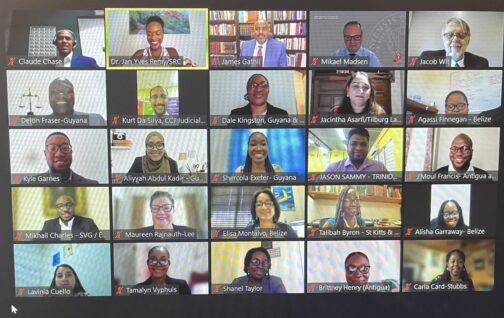Virtual programme on Caribbean Community Law & the Caribbean Court of Justice (CCJ)
Bridgetown, Barbados. The University of the West Indies (UWI) Cave Hill, Barbados, Shridath Ramphal Centre for International Trade Law, Policy and Services (SRC) hosted an online short course on Caribbean Community Law & the Caribbean Court of Justice (CCJ) in the Original Jurisdiction. The course was organized in collaboration with the Organisation of the Eastern Caribbean States (OECS) Commission and the UWI, Cave Hill Campus’ Centre for Progressive Development and Lifelong Learning (CPDLL) with the support from the Judges and staff of the Caribbean Court of Justice (CCJ).
Led by the efforts of Dr Jan Yves Remy, Director of the SRC, who served as the course facilitator, with the able assistance of Mr Claude Chase, legal counsel at Baker McKenzie, experts on the subject matter were brought together for five days to share their knowledge and engage in thought-provoking discussion with about 50 participants from across CARICOM. The programme was organised to educate legal practitioners, students and judges on the substantive law governing the Caribbean Community under the regime of the Revised Treaty of Chaguaramas establishing the Caribbean Community, including the CARICOM Single Market & Economy (RTC), the procedural framework facilitating the enforcement of rights provided by the RTC, and the position of the CCJ as an international court in the wider international community.
The course was opened with welcome remarks by CCJ President, The Honourable Mr. Justice Adrian Saunders and Dr. Remy. In his brief opening words, the President highlighted that the framework of the RTC and the judgments of the CCJ in disputes concerning the Treaty not only ‘demonstrate and promote the rule of law’ but also ‘go a long way in…optimising the social and economic prospects of CARICOM States and peoples and deepening the integration process in a principled and lawful manner.’ He also made the point that although the RTC ‘is principally an economic treaty…it is not just about companies and businesses.’ ‘Fundamentally’, he said, ‘it is about people’.
Dr David Berry, senior lecturer in the Faculty of Law at the Cave Hill Campus and author of the text ‘Caribbean Integration Law’, started the course’s substantive elements by illustrating the core characteristics of the Caribbean Community and its characteristics under the RTC. This was built upon by CCJ Judicial Counsel Kurt Da Silva, who explained the origins and key features of the CCJ before examining the Court’s original jurisdiction, whereby the Court has exclusive and compulsory jurisdiction to interpret and apply Community Law. They were then joined by CARICOM General Counsel, Dr Corlita Babb-Schaefer, who has appeared before the Court on numerous occasions on behalf of the Community and added valuable insight from that perspective on the Court and how it has performed in its role in upholding the rule of law.
In the following two days, participants were treated to a more in-depth look at particular rights and benefits conferred by the RTC and how the CCJ has been called into action to ensure that the people and companies of the Community are not deprived of their enjoyment of those rights. Dr Berry led the discussion on the free movement of goods on the second day and was joined by Ms Simone Mayhew QC, who has appeared before the CCJ in its original jurisdiction. CARICOM’s Ms Gladys Young continued with free movement of services and people on Day 3 and was well supported by her CARICOM Secretariat colleague Dr Chantal Ononaiwu and Dr Kathy Ann Brown, the latter a Jamaican Judge who sits on the International Tribunal on the Law of the Sea.
Former President of the CCJ, Sir Dennis Byron, then gave a very detailed lecture on how the Original Jurisdiction works and its different facets, before current CCJ Judge, The Honourable Mme. Justice Maureen Rajnauth-Lee, and another practitioner with experience before the Court, Mr Hans Lim A Po of Suriname, joined to continue the discussion on the practical workings of the CCJ’s OJ. Mr Da Silva also returned to take participants through a graphic description of the Court’s referral jurisdiction, which was a topic of great interest throughout the course.
The referral jurisdiction, by which national courts and tribunals of CARICOM Member States are obligated to refer questions on the interpretation and application of the RTC to the CCJ when they arise in the course of proceedings before them, is yet to be engaged, and there was lively discussion each day on the possible reasons for this. It was noted that the Court is seeking to address this and has created a Referral Manual to train judicial officers and attorneys-at-law in the Community on why, when, and how referrals may be done.
The discussion of the CCJ as an international court, especially in comparison to other such courts, was picked up on the final day as Professor Mikael Madsen, an expert on international courts, spoke on situating the CCJ in a broader context. Professor Madsen, of the University of Copenhagen, was then joined by Professor James Gatthi of Loyola University, The Honourable Mr. Justice Jacob Wit of the CCJ and Mr Chase as they engaged in a riveting discussion on the work of the CCJ in its 16 years of existence and what it has done to set itself apart as a model of judicial excellence.
After having absorbed an enormous amount of information in an unbelievably short time, the participants were then challenged to apply what they had learned in a simulation. They were given a fact pattern resembling an original jurisdiction matter, which they were required to prepare in groups and then appear as counsel for the parties before a group of ‘judges’, led by Justice Wit and including Dr Remy and Mr Da Silva as the other ‘judges. All of the participants agreed that the course had been well received, and very much needed and encouraged the organizers to consider more practical short courses of this kind.


